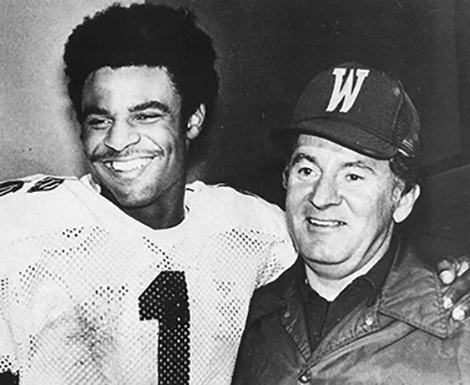It’s college football season, and there also is some déjà vu in the air for University of Washington fans who remember the Huskies’ fortunes in the 1970s.
The Huskies of 2022 have a new head coach, Caleb DeBoer, whose background up to now of relative obscurity in college coaching, plus the uneasy situation he’s stepping into, is reminiscent of the era that began 50-plus years ago with the debut of Don James as UW’s coach.
Remember? After some uncharacteristic losing seasons under then-coach Jim Owens, Washington turned to James in hope that his success at relatively unknown Kent State University (the school who DeBoer will face in his debut Sept. 3) would translate to gridiron glory for the Huskies. Ditto for DeBoer, who, with previous success at Fresno State and tiny University of Sioux Falls (in South Dakota), is taking the Huskies’ reins after their flop of a 2021 campaign. UW fans, including those who wonder if his coaching pedigree is sufficient to reignite their team, will be over-the-moon happy if DeBoer can eventually replicate the turnaround that James accomplished.
When Washington began the 1977 season with a 1-3 record, fans were restless. In his third year at the helm, James had a 12-14 record amid widespread discontent. That started changing on Oct. 8, when Washington demolished Oregon 54-0. The Huskies won the rest of their games that year and stunned heavily favored Michigan in the Rose Bowl behind Warren Moon, who overcame struggles as Washington’s first black quarterback and was named the game’s most valuable player.
James’ Huskies became known for disciplined play, tough hitting, ferocious defense, and winning. The 1979 team finished 10-2 and upset Texas in the Sun Bowl. The 1980 and 1981 teams went to the Rose Bowl, with the latter squad blanking Iowa 28-0. In 1984, Washington beat Oklahoma in the Orange Bowl to finish 11-1 and ranked No. 2 in the country. That same year, Sports Illustrated named what it considered the top three coaches in college football: “1. Don James, 2. Don James, 3. Don James.”
In December 1991, as the undefeated Huskies prepared to play Michigan again in the Rose Bowl, no less than then-President George H. W. Bush was among the well-wishers gushing over James’ selection as national college football coach of the year. The Huskies backed up the honor in front of 103,566 spectators in Pasadena, Calif. and millions of TV viewers by trouncing Michigan 34-14. The Huskies were declared national champions by the CNN/USA Today Coaches Poll after completing UW’s first undefeated team since 1916.
Then came trouble. On Nov. 5, 1992, five days after Washington beat Stanford for its 22nd win in a row, news broke that UW quarterback Billy Joe Hobert received loans totaling $50,000 from an Idaho scientist named Charles Rice. A month later, The Los Angeles Times began a series of articles questioning the integrity of the Washington football program and whether James was heading an outlaw program.
In August 1993, following a six-month investigation, the Pac-10 Conference put Washington on a two-year bowl probation and docked the Huskies 20 player scholarships and $1.4 million in television revenue–the most severe punishment in conference history. Conference investigators detailed 24 allegations referencing Hobert, Husky boosters, and manipulated expense reports by student hosts.
The Pac-10 also stated “there was no evidence that the University of Washington set out to achieve a competitive advantage.” The conference determined Rice wasn’t a booster and had no connection to the university, and that although Rice’s loan was inappropriate because it was predicated on Hobert’s projected earnings as a professional player, it was “inconclusive” whether UW coaches should have known about its existence. The Pac-10 cited a booster in California for paying Husky players for minimal or non-existent work in summer jobs. (Today, college athletes, football players included, can accept money for doing commercial endorsements, appearances and social media posts, writing books, hosting camps, giving lessons, and other commercial activities outside of their schools, all without jeopardizing their standing with their schools and athletic eligibility).
Following the announcement of probation, James resigned in protest, rocking the college football world. While being lauded by some of his supporters, he was criticized by others for abandoning his players at such a difficult time.
James, who never coached again, later claimed UW had turned its back on him and the team, leaving them to the Pac-10’s mercy. He said he told the school’s administrators that “if this university isn’t going to support us any better than that, after all the money these players have made for them, then I’m not going to work here any more.”
James, who died in 2013 at the age of 80, rolled up 153 victories with the Huskies, the most of any coach in UW history, dating to 1889. Now it’s DeBoer’s turn.
